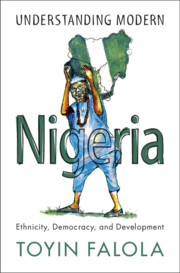Book contents
- Understanding Modern Nigeria
- Understanding Modern Nigeria
- Copyright page
- Dedication
- Contents
- Figures
- Maps
- Preface
- Acknowledgments
- Part I Introduction
- Part II Context and History
- 3 Colonial Modernity
- 4 Political Pluralism
- 5 Religious Identities
- 6 Federalism and Its Fault-Lines
- Part III Democracy and Governance
- Part IV Development Crises
- Part V Reforms and Revolutions
- Part VI Conclusion
- Bibliography
- Index
3 - Colonial Modernity
from Part II - Context and History
Published online by Cambridge University Press: 09 June 2021
- Understanding Modern Nigeria
- Understanding Modern Nigeria
- Copyright page
- Dedication
- Contents
- Figures
- Maps
- Preface
- Acknowledgments
- Part I Introduction
- Part II Context and History
- 3 Colonial Modernity
- 4 Political Pluralism
- 5 Religious Identities
- 6 Federalism and Its Fault-Lines
- Part III Democracy and Governance
- Part IV Development Crises
- Part V Reforms and Revolutions
- Part VI Conclusion
- Bibliography
- Index
Summary
“Colonial Modernity” examines the history and impact of colonialism on the present configuration of Nigeria, especially how it has invoked the deficiencies (ignorance, poverty, and diseases) of modern African states, or rather how those deficiencies have been focalized as the modern understanding of Africa. Nigeria as a forced invention of colonial modernity lacks the necessary factors of homogeneity, with which to achieve a truly adequate state of nationhood in transitioning from colonialism to independence. Rather, the perceived and existing differences among the numerous ethnic groups are exploited by colonialists to achieve an effortless divide and rule system of colonial administration, dominant among which is the challenge of Nigerian unity and the nation-building project complicated by fundamental ideological and political differences between the North and the South. Thereafter, colonial policies ensured that the Nigerian state was birthed on an imbalanced slope, and every member demanded relevance despite those imbalances. One such imbalance was due to the spread of Western education, which was intended to prepare people for modern governance and responsibilities. Its influence began creating problems even before independence. However, this discourse suggests Nigeria can only manifest into a functional and adequate nation-state when people are conscious of the fault-lines along the path of its invention.
- Type
- Chapter
- Information
- Understanding Modern NigeriaEthnicity, Democracy, and Development, pp. 47 - 73Publisher: Cambridge University PressPrint publication year: 2021

